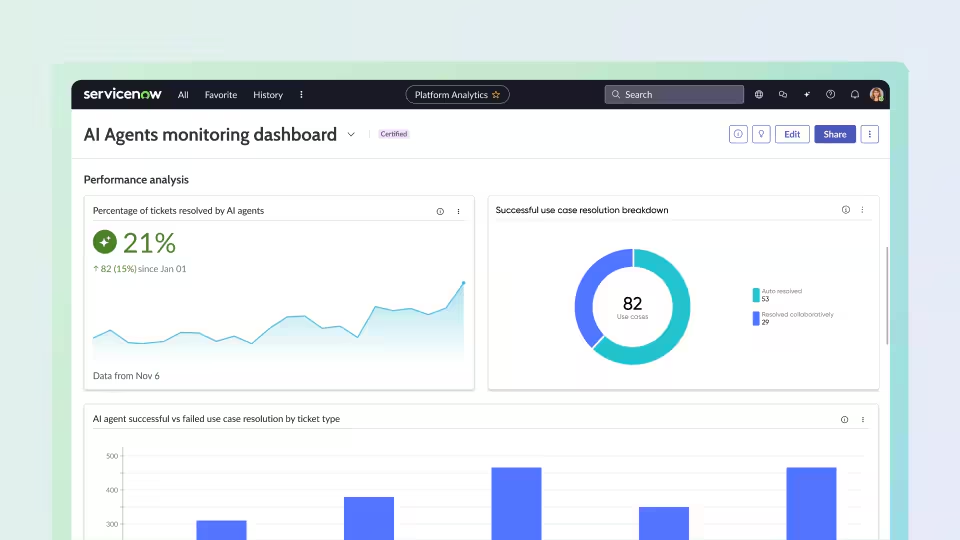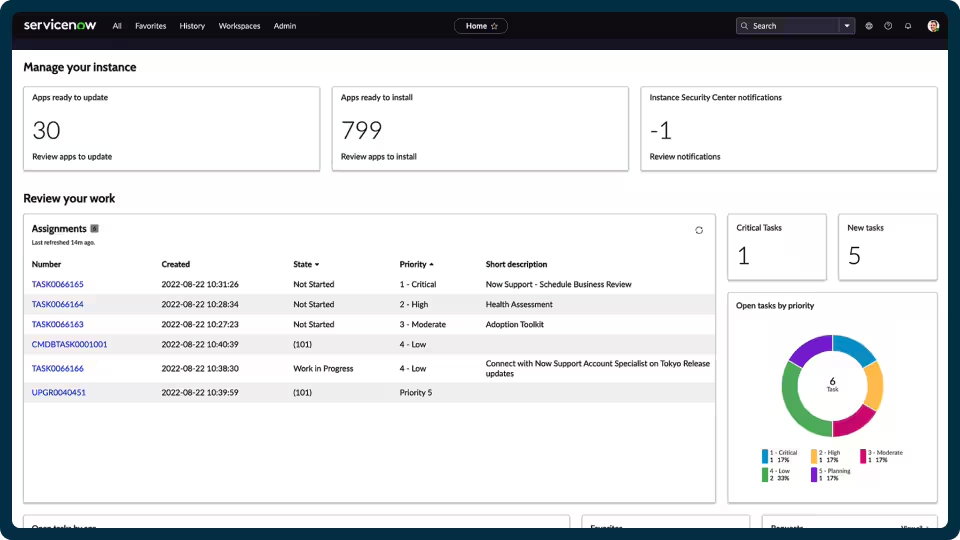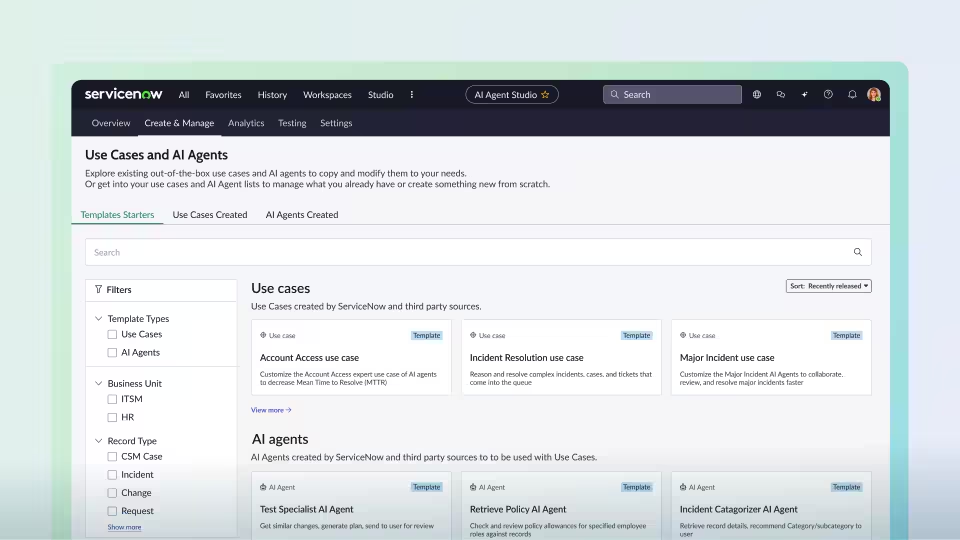
Your ServiceNow instance has powerful AI capabilities that may be sitting idle. While basic ticketing and ITSM processes run, the platform’s advanced features likely remain untapped, and it’s time to start using them to leverage your ServiceNow capabilities.
Most organizations use only ServiceNow’s baseline ITSM capabilities, missing out on transformative features like Intelligence Workspaces, Agent Intelligence, and Dynamic Translation. Let’s start with assessing your ITSM capabilities and expand our focus to encompass ServiceNow’s extended suite of tools and AI features.
Strengthen your IT service management (ITSM)
AI capabilities in ServiceNow require well-structured IT service management (ITSM) processes, which will set the foundation for integration of future AI tools and intelligent systems.
ITSM’s impact on productivity
Data quality is fundamental to AI success, which is why organizations should leverage Agent Intelligence, which learns from historical tickets.
It’s important to note that inconsistent ITSM processes with incomplete fields significantly reduce AI accuracy, and without clean, structured data, even the most sophisticated AI tools will struggle to deliver accurate results. Agent intelligence ensures ServiceNow learns from relevant history and integrates the right data to boost your ServiceNow accuracy.
Incident handling efficiency improves with a refined framework. A well-tuned incident and problem management system simplifies tickets, enabling AI to efficiently manage routing and repetitive tasks. This allows your service teams to focus on complex issues while AI handles routine work.
Knowledge utilization drives faster resolutions. When knowledge articles and resolution steps are properly documented, virtual agents can quickly identify solutions and reduce downtime. This creates a cycle of continuous improvement as both human and AI agents contribute to an expanding knowledge repository.
Following the above will improve your overall ITSM framework and positively impact your organization’s productivity.

Essential ITSM improvements for AI readiness
Consistent ticket classification provides the foundation for AI learning. That’s why your organization should consider implementing uniform incident categorization to ensure Agent Intelligence has reliable training data to work with. Without standardized classification, AI will struggle to recognize patterns and make accurate predictions about incident routing and resolution.
Comprehensive knowledge bases also support both human and AI agents. You can build this by documenting common incidents thoroughly to create a reliable resource repository that both your team and AI tools can leverage. The quality of your knowledge base directly impacts how effectively virtual agents can resolve issues without human intervention.
Incident-problem correlation reveals important patterns, and linking related incidents to problems helps AI identify recurring issues and suggest more effective root-cause analysis. This correlation enables predictive capabilities that can help prevent future incidents by addressing underlying problems.
Structured change management significantly reduces risk, which is why clear approval processes enable AI to accurately assess potential impacts and recommend pre-approvals for low-risk changes. When change management follows consistent processes, AI can help streamline approvals and identify potential conflicts or risks before implementation.
AI integration benefits
Remember that Intelligence performance improves with quality data. Consistent ITSM information enhances ticket categorization and routing accuracy, with continuous learning from each resolved incident. As your ITSM practices mature, AI effectiveness compounds, delivering increasingly sophisticated automation.
It’s important to note that standardized ITSM event logs enable Predictive Intelligence to forecast potential service disruptions based on historical patterns. This shifts your IT operations from reactive to proactive, allowing teams to address potential issues before they impact users.

Practical implementation steps
Consider getting comfortable with Now Intelligence Workspaces. This AI-driven interface personalizes itself for each IT team member, presenting relevant tasks, analytics, and automated suggestions. Enable it for your service desk team first – they’ll immediately see personalized views of their work, with AI-powered suggestions for similar incidents and solution articles.
Next, activate Performance Analytics for your most critical business services. Unlike basic reporting, Performance Analytics uses machine learning to identify patterns and anomalies. Configure it to track key metrics like resolution time and first-call resolution rate. The system will begin generating insights within weeks.
For knowledge management, implement Now Intelligence Search. This goes beyond keyword matching to understand the context of searches, dramatically improving knowledge article discovery. Configure it to analyze your existing knowledge base and start suggesting relevant articles to agents during ticket resolution.
Advanced integration opportunities
Once basic AI features are running, explore Integration Hub with Flow Designer. This powerful combination allows you to create automated workflows that extend beyond ServiceNow. For example, you can build flows that automatically provision Azure resources when requested through ServiceNow, with AI ensuring proper approvals and compliance checks.
The Now Platform App Engine enables even deeper customization. Use it to build AI-powered custom applications that extend ServiceNow’s capabilities. For instance, you could create an application that uses ServiceNow’s machine learning APIs to analyze patterns in your change management process and automatically generate risk scores for proposed changes.
Strategic implementation framework
Success with ServiceNow AI requires an approach backed by data and analysis. Delve into User Experience Analytics to understand how your teams currently use the platform. This tool reveals specific processes that would benefit most from AI enhancement. Use these insights to prioritize your AI implementation roadmap.
Next, leverage the Now Intelligence Hub to centralize your AI initiatives. This ensures consistent training data across different AI features and enables cross-functional learning. For example, patterns identified by Predictive Intelligence can inform Virtual Agent responses, creating a more intelligent service experience.

Looking Ahead: continuous innovation
ServiceNow’s AI capabilities continue evolving, and the platform now includes features like Document Intelligence for automated document processing and Analytics Center for consolidated insights. Stay current with these developments by enabling Instance Scan, which continuously evaluates your instance for optimization opportunities.
The future of IT service management lies in intelligent automation, and ServiceNow provides the tools to get there. Start with Agent Intelligence and Process Optimization for immediate wins, then build toward more advanced features like Predictive Intelligence and custom AI applications. Each step increases productivity while laying the foundation for further innovation.
Remember that every manual process in your ServiceNow instance represents an opportunity for AI-powered automation. The question isn’t whether to implement these features, but how quickly you can start realizing their benefits.
For more information on building a productive ServiceNow team, consider reaching out to Procom’s specialized talent team. With over 45 years of IT recruitment experience, Procom is your trusted partner for securing the ServiceNow expertise your organization needs to excel.





